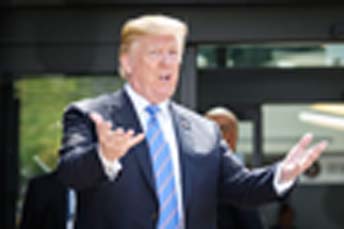
Europe is “possibly as bad as China” on trade, US President Donald Trump said in an interview broadcast Sunday, with trade wars emerging against both the Asian giant as well as longtime allies in Europe and Canada.
“The European Union is possibly as bad as China, only smaller,” Trump said on Fox News’ “Sunday Morning Futures” program.
“They send a Mercedes in, we can’t send our cars in. Look what they do to our farmers. They don’t want our farm products. Now in all fairness they have their farmers… But we don’t protect ours and they protect theirs,” he said.
Trump had already threatened tariffs on cars imported from the European Union, in response to the EU’s retaliatory tariffs last week on iconic US products including bourbon, jeans and motorcycles.
The EU retaliation came after Trump’s administration on June 1 struck Europe as well as allies in Canada, Mexico and elsewhere with tariffs on aluminum and steel.
Canada’s retaliatory tariffs take effect Sunday against American products including Florida orange juice, ketchup and Kentucky bourbon.
Canada and the US are among the world’s largest trading partners, with an estimated $673.9 billion in goods and services exchanged in 2017, with the US scoring a small surplus ($8.4 billion), according to US government data.
At Trump’s insistence, Canada, Mexico and the US are renegotiating the North American Free Trade Agreement.
“NAFTA, I could sign it tomorrow but I’m not happy with it. I want to make it more fair, OK?” Trump said, adding that he wants to wait until “after the election.”
Trump’s Republicans are fighting to retain control of Congress in November midterm elections.
In the interview the president again complained about Canada’s protected dairy industry, saying “that’s not fair.”
Against China, the world’s second-largest economy, the White House in mid-June announced stiff 25 percent tariffs on Chinese imports, sparking immediate retaliation from Beijing.
Trump on Wednesday said he supported tougher restrictions on foreign investment in sensitive technology, as well as export controls on those goods, but he stopped short of imposing specific restrictions on China.
Asked about that decision, Trump said in the interview that he is not backing down on China tariffs.
“No, no, no, no,” he said, noting that more tariffs could be imposed if there is no deal with China.
“I will tell you, China wants to make a deal and so do I, but it’s got to be a fair deal for this country,” he said.
The US has complained about Chinese policies that Washington said either forced companies to relinquish key technology or allowed China to steal it outright.
The president announced 25 percent import tariffs on hundreds of Chinese products to pressure the country to alter its practices. Those tariffs are due to take effect July 6.
Meanwhile, the US Chamber of Commerce, the nation’s largest business group and customarily a close ally of President Donald Trump’s Republican Party, is launching a campaign on Monday to oppose Trump’s trade tariff policies.
With some of America’s tightest trading partners imposing retaliatory measures, Trump’s approach to tariffs has unsettled financial markets and strained relations between the White House and the Chamber.
The new campaign, detailed first to Reuters, is an aggressive effort by the business lobbying giant. Using a state-by-state analysis, it argues that Trump is risking a global trade war that will hit the wallets of U.S. consumers.
“The administration is threatening to undermine the economic progress it worked so hard to achieve,” said Chamber President Tom Donohue in a statement to Reuters. “We should seek free and fair trade, but this is just not the way to do it.”
The Chamber, which has 3 million members, historically has worked closely with Republican presidents and praised Trump for signing business tax cuts in December. But mounting trade tensions have opened a rift with the president.
Trump has implemented billions of dollars in tariffs targeted at China, Canada, Mexico and the European Union, saying such moves are needed to offset trade imbalances.
Nations have begun retaliating. On Friday, Canada struck back at U.S. steel and aluminum tariffs, vowing to impose punitive measures on $12.6 billion worth of American goods until Washington relents.
China is expected to impose a new 25-percent tax on soybeans in July. Mexico is adding duties to pork imports. The EU has targeted $3.2 billion in American goods exported to the 28-member bloc, including bourbon and Harley Davidson motorcycles.
Pushing back on Trump, the Chamber based a state-by-state analysis on data from the U.S. Department of Commerce and government agencies in China, the EU, Mexico, and Canada.
Trump has previously been persuaded to back off of trade threats with the argument that states that backed him in the 2016 presidential campaign will be hard-hit.
For example, the Chamber said Texas could see $3.9 billion worth of exports targeted by retaliatory tariffs; Tennessee, $1.4 billion; and South Carolina, $3 billion.

